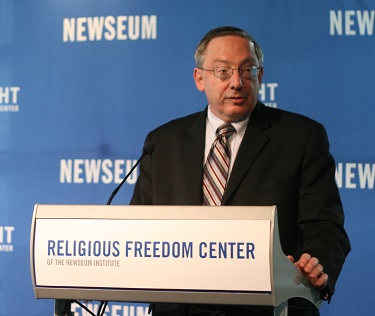By Bob Allen
Religious liberty is becoming a casualty of America’s culture wars, a leading expert on the separation of church and state told an audience Nov. 7 at the Newseum in Washington.
“I certainly didn’t predict the last 20 years,” University of Virginia law professor Douglas Laycock said at a symposium marking the 20th anniversary of the Religious Freedom Restoration Act, landmark legislation that made it harder for the government to restrict religious exercise.
 “I claim no ability to predict the next 20, but I think this whole debate about sexual morality and religious liberty and the context of sexual morality is turning much of the country against religious liberty, or at least turning much of the country into a view that religious liberty must be interpreted very narrowly,” Laycock said.
“I claim no ability to predict the next 20, but I think this whole debate about sexual morality and religious liberty and the context of sexual morality is turning much of the country against religious liberty, or at least turning much of the country into a view that religious liberty must be interpreted very narrowly,” Laycock said.
Laycock said pitting religion against sex turns many people against religious liberty. He compared religious-liberty views in the United States with those in France, whose law is modeled after the U.S. Constitution’s free-exercise and non-establishment clauses.
“They take a much narrower view of what religious liberty means,” Laycock said. “The biggest reason is because in France religion was on the wrong side of the revolution. In America the churches were on the right side of the revolution.”
Laycock asked the audience to consider the question: “What if we had a new revolution in our time?”
“The sexual revolution that began in earnest in the ’60s carries on with the current front about same-sex marriage and now contraception, which had been a neutral zone for a long time,” he said. “Conservative churches in this country have been consistently on the losing side of that revolution.”
“Like the Catholic Church in France they oppose not just the revolution’s excesses but they oppose its core,” he said.
Laycock said debates over sexual issues like abortion, same-sex marriage, contraception, sterilization and emergency contraception all share one thing in common.
“What one side views as a grave evil the other side views as a fundamental human right,” he said. “And for tens of millions of Americans, conservative churches have made themselves the enemies of liberty. And for tens of millions of Americans, what religious liberty now does is empower their enemies, and that, in their view, is a bad thing.”
Laycock said many Americans experience “a growing intuitive reaction” against such discussions.
“They are tired of hearing the Catholic bishops and evangelical preachers and view them as trying to restrict other people’s sex lives,” he said. If that trend in public opinion continues, he said, the Religious Freedom Restoration Act “will be no help.”
“There are people who still believe in the American tradition of live and let live, who still believe in liberty for all,” he said. “But increasingly we are deeply polarized with conservative religious churches on one side, secular activists on the other side, and the moderate/liberal/center churches in between, declining in numbers and mostly keeping their mouth shut and not being actively involved in this debate.”
“That kind of polarization, I think, is a real problem,” he said.
Laycock said the tendency of both sides to insist on a total win — liberty for them and not liberty for the other side — “is a very bad thing for religious liberty.”
“If the people no longer believe in religious liberty, we will lose it,” Laycock said. “And that will be a loss for America, no matter which side of the culture wars you find yourself on.”
